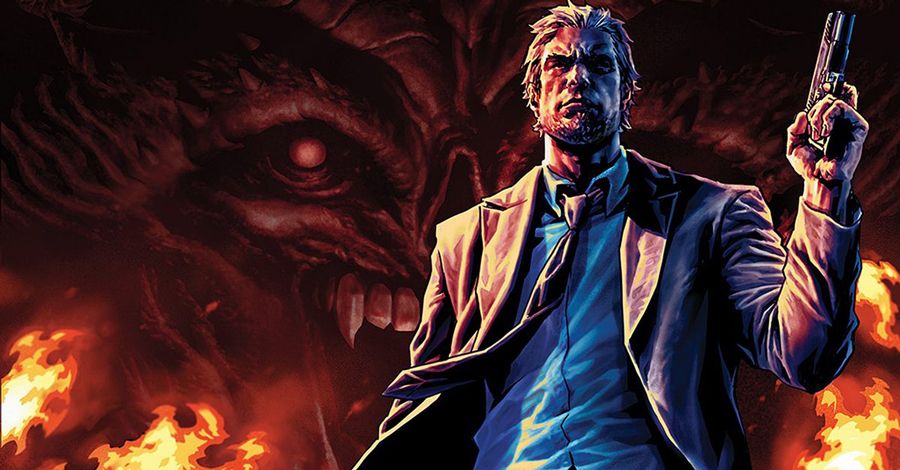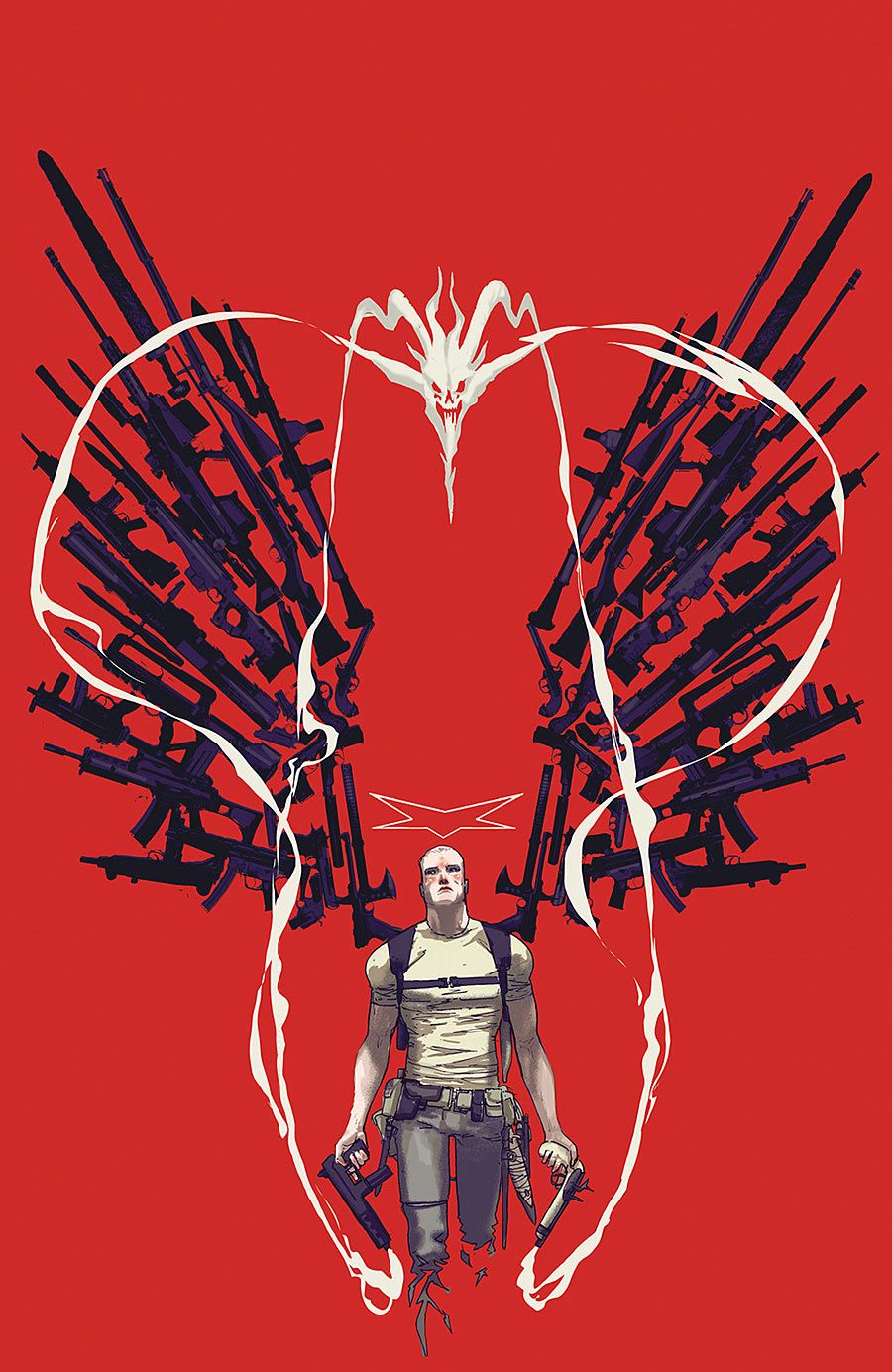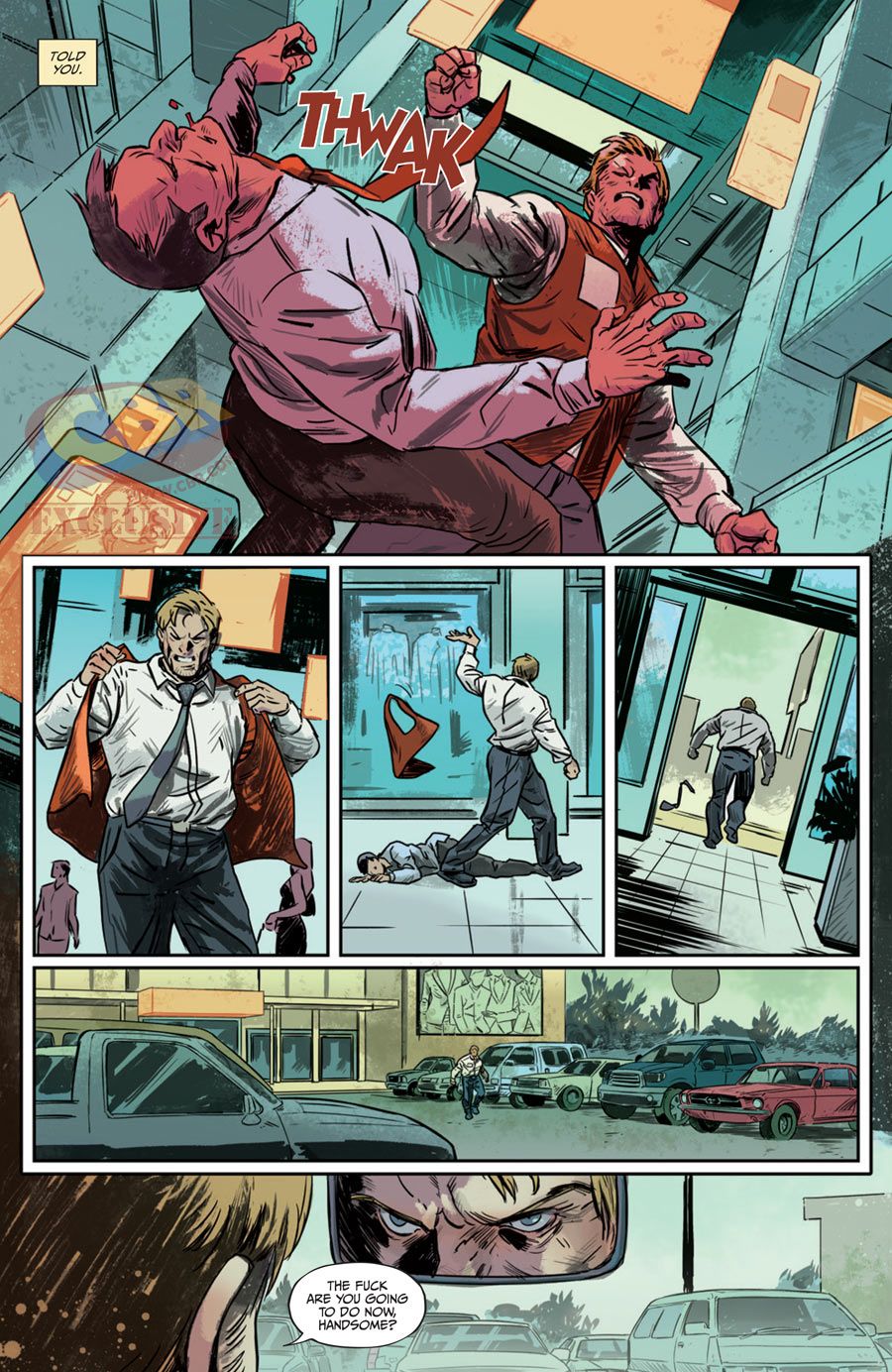Acclaimed "Sons of Anarchy" and "The Bastard Executioner" creator Kurt Sutter is bringing his hardcore storytelling chops to comics with his new sci-fi/fantasy property "Lucas Stand." Through BOOM! Studios, Sutter resurrected the project that started out in development at Fox -- and never saw the light of day -- in the character's first original comic series, alongside co-writer Caitlin Kittredge and artist Jesus Hervas. The first issue hit stands this week with a glorious cover by Lee Bermejo.
The series follows Lucas Stand, a military vet who, suffering from various addictions and unable to reintegrate into society because of his horrific experiences, decides to take his own life. It's not the end of the road for Stand, though -- Hell comes calling with an opportunity to restore the balance of evil by hunting down escaped demons, in exchange for cleansing his sins.
CBR News had the opportunity to chat with Sutter about his hellish new series, getting some insight into his history with comics, the path to resurrecting the property, his collaboration with Stephen King, being a "reverse Robert Kirkman," and much more.
CBR News: What's your experience with comics as both a reader and creator?
Kurt Sutter: I didn't really get into comics until later on -- when I really started writing 15 or 20 years ago I really got into it through the graphic novels. I really wasn't much of a comic reader growing up. I really spent most of my childhood in font of a TV. But I started getting to graphic novels when I got into grad school, and I was fascinated by the extent of what you could explore, and the artwork. Through graphic novels I tried to option a couple properties over the years, and then through that I really came around to the standardized comic book. I came around it through the back door -- and I obviously became more involved when I started doing the "Sons of Anarchy" comic book around 5 or 6 years ago, working with BOOM.
I was in Paris when the French market for graphic novels was way ahead of us. I remember going into a store and seeing a wall of these amazing stories and artwork, and didn't understand anything in French, but you didn't need to. So that's when I started getting fascinated by them and started looking at more properties and potentially optioning them. And through BOOM, I just sold them another original property. All the limitations you get in film and TV in terms of reality or production limitations, you get to blow them out [in comics].
How did the project land at BOOM specifically?
We interviewed a few houses for "Sons of Anarchy," and I really liked BOOM. I really liked that they were hungry and growing at the time. And it's all about the relationships. I have really good relationships there, and I trust them. When we went out with "Lucas Stand" it was the same kind of thing, we had a couple houses that were interested, but I had a relationship with [BOOM] -- they knew how I operated, they knew what my standards were, so it just sort of made sense to keep it in house there.
"Lucas Stand" was a hurdle initially because it was a script I wrote for FOX, so we had to wait for the [rights to the] property to run out, because technically they own the property until it runs out. So we had to wait for that to go away, so there was a lot of hurdles getting "Lucas" up and running, and it took more than a year to get that done. And they really hung in there, and they really muscled through with us, and I appreciate all that stuff -- it pays off.
Has the property changed much?
Yes and no. We're breaking the pilot into two or three comics -- so the story is pretty point by point. But then we hired [co-writer] Caitlin [Kittredge], who's a great comic book writer, so they got to interpret that [original] script in terms of what each panel would look like, and what the action line and the dialogue will be within those panels. So it tends to expand in different directions. And it grows into something else based on the medium. We found there were no limitations for where we go and what we wanted to do.
I think for the most part it stayed the same. We made some changes story-wise so it would serialize better between each book. For all the reasons that it would've been difficult to do as a series in terms of production and explaining the world, you're able to do within style and within format in the comic book world. You have those tools to create exposition and explain things that most people who read comic book are used to. You have the luxury of being able to do that without having to turn the story upside down and try and make it exciting, or things like that. I think for the most part it's pretty much been on point. If anything, it's gotten bigger, not smaller.
What draws you to the character of Lucas Stand the most?
The same thing I tried to do with "Bastard Executioner" -- I love writing the urban crime drama. But I just needed to artistically cleanse the palette and do something I wouldn't do -- scare me in a good way; something I wasn't comfortable in. And sci-fi was definitely not in my wheelhouse. I love watching it, I'm a fan of it, but I've never really written anything [sci-fi]. I've always been a fan of those big iconic archetypes in terms of good and evil, and heaven and hell and all that stuff, so it seemed like a cool world to explore.
I didn't say anything in the book, but when I started working on this Stephen King started mentoring me on this process. He was too busy to come on board but he walked it through and gave me notes. And he was the one when it was all done, he said, "You gotta give him a dog."
I deal with a lot of vets, they're sort of the biggest fan base for "Sons of Anarchy," and I see a lot of what Lucas goes through first hand in recovery meetings and everything like that, so it's all pretty close to home -- not necessarily for me, but people who are close to me.
I also love the idea that good and evil has no starting point or ending point, so we can go sideways in time -- past and future -- and I though that opened up the world to a sort of cool nonlinear serialization.
In the first issue you go to Nazi Germany, do you plan to go to many other eras?
I think the idea is that each series will explore a different era. The idea is that he touches down in that era, and once he touches something, he assumes the identity of that era in terms of weapons and cars and stuff like that. If it moves forward, maybe we'll do one where he encounters his dad in Vietnam. And maybe near future time periods.
But the idea is that we jump sort of back and forth and have a really big plot with places and times and themes to play with.
Would you return to the property, in comics or TV, if it takes off?
The great thing about doing a comic is that BOOM and I get to control it and take it in directions I want to take it in. And ultimately if someone else wants to do something with it -- I'm sort of doing the reverse of what Robert [Kirkman] did with "The Walking Dead," and going backwards and creating a comic -- so hopefully if somebody comes to us and is interested in the property, then we have control of the property and can say, 'This is the way I want to do it, but I want it to look like this and have these components.'
The problem with selling it [as a TV series] is I'd have to conform and change it so much to fit somebody's need or schedule or budget. And now I don't have to: I can let it live, and I can let it grow, and become whatever it's become. And if someone is interested in that and sees it as well as I do, they can come in and say, 'Hey, we want to do it.' It allows us to really see what it is, instead of turning it into something it's not before it has a chance to live -- which unfortunately happens a lot with TV and features.
Any themes or final thoughts you want to get across to readers?
Sutter: I think the themes speak for themselves. Obviously, it's going to be a darker comic from my camp, but I also think it has the emotional themes that "Sons" does, but hopefully it'll be a cool read and people will step away with it thinking about something more meaningful than the fabulous art on the panels. So we'll see.
"Lucas Stand" #1 is in stores this week.



